Calorie content of corn and features of its composition: vitamins, minerals and beneficial properties of the queen of the fields
For its variety of beneficial properties and ease of cultivation, corn is called the “queen of fields” and “second bread”. A bright grain crop came to us from distant America. Now it is successfully cultivated in our latitudes. This plant produces a harvest in late summer, but can be purchased year-round in canned or frozen form. Let's look at the health benefits and harms of this product.
Corn calories
This plant has more than a hundred varieties with different colors and cob sizes. Many people are interested in the question of how best to prepare and eat it in order to retain all the nutrients and not gain extra pounds.
How many calories in 1 cob
Corn can be considered a dietary product, since its energy value is only 86 kcal. It is quite difficult to determine “by eye” how many calories an ear of boiled corn contains, although it is possible. You can calculate calorie content using the following formula:
- the approximate weight of an average cob is 300 g;
- a head of cabbage without grains makes up one third of the total product;
- The calorie content of an cob is equal to the calorie content of 200 g of corn (172 kcal).
Attention! The easiest way to find out the actual calorie content of the product you purchased is to weigh the cob before eating and write down the value. After eating, put the remaining head of cabbage on the scale, subtract the resulting number and calculate the calorie content.
Calorie content of corn depending on preparation
The calorie content of a product depends not only on the variety, but also on the method of preparation.
So, 100 g of corn contains:
- raw - 86 kcal;
- V popcorn without oil - 325 kcal;
- fried/grilled - 441 kcal;
- boiled - 123 kcal;
- microwaved/steamed - 131 kcal;
- in canned food - 119 kcal.
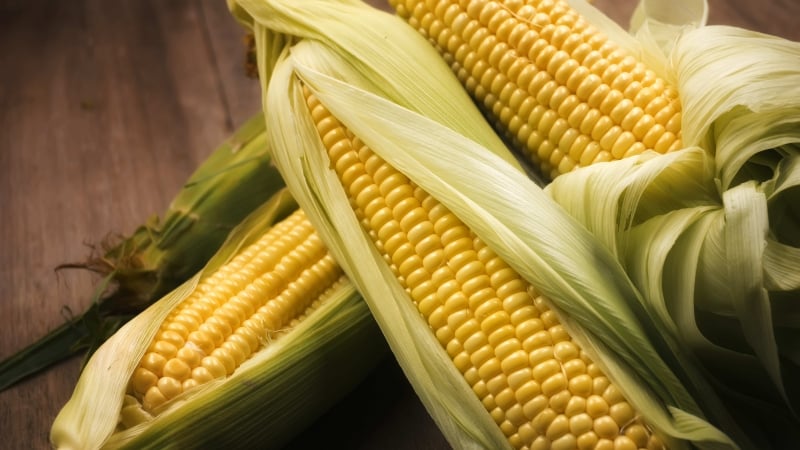
How many carbohydrates, fats and proteins
The oxidation of 1 g of carbohydrates produces 4 kcal. Content of important nutrients (BJU) in corn:
- 100 g of raw grain contains: 3.5 g of protein, 2.8 g of fat, 15.6 g of carbohydrates;
- in 100 g of boiled cereal: 4.1 g protein, 2.29 g fat, 22.6 g carbohydrates;
- per 100 g of canned product: 3.9 g protein, 1.29 g fat, 22.8 g carbohydrates.
Reference. The nutritional value of a product is determined by its nutrient content. Proteins are the main building material and basis of cells and tissues. Fats make up cell membranes and nerve fiber sheaths and are involved in the synthesis of vitamins, hormones and bile acids. Carbohydrates are the main source of energy for humans.
Compound
Corn grain is a real storehouse of important and necessary minerals for humans: calcium salts, potassium, iron, magnesium, phosphorus, vitamins B, E, PP, chlorine compounds, copper, sulfur, selenium, arsenic, gold, etc. – a total of 26 elements from Mendeleev’s periodic table.
Corn protein contains essential amino acids such as lysine and tryptophan, which are not independently synthesized in the body.
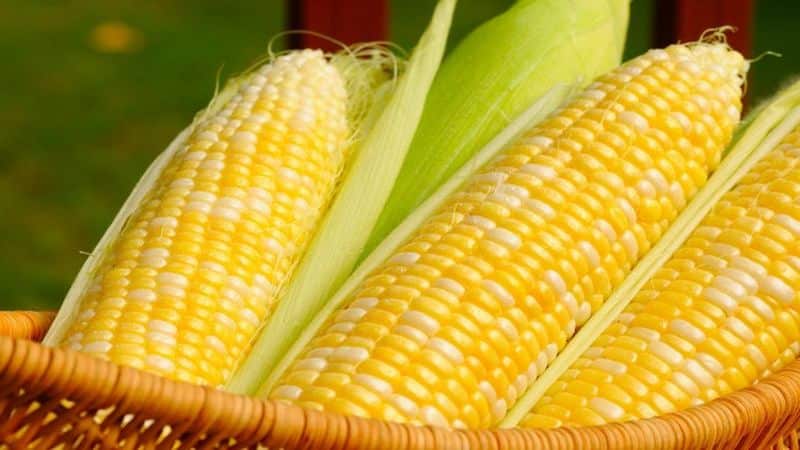
What vitamins and minerals does it contain?
Of the fat-soluble vitamins, corn contains A, beta-carotene, alpha-carotene, E and K. Of the water-soluble vitamins, there are vitamins C, B1, B2, B3 (PP), B4, B5, B6 and B9.
Vitamins:
- vitamin PP - 2.1 mg;
- choline - 71 mg;
- beta-carotene - 0.32 mg;
- vitamin A - 53 mcg;
- vitamin B1 - 0.38 mg;
- vitamin B9 - 26 mcg;
- vitamin E - 1.3 mg;
- vitamin H - 21 mcg.
Macronutrients:
- potassium - 340 mg;
- phosphorus - 301 mg;
- sulfur - 114 mg;
- magnesium - 104 mg;
- chlorine - 54 mg;
- calcium - 34 mg;
- sodium - 27 mg.
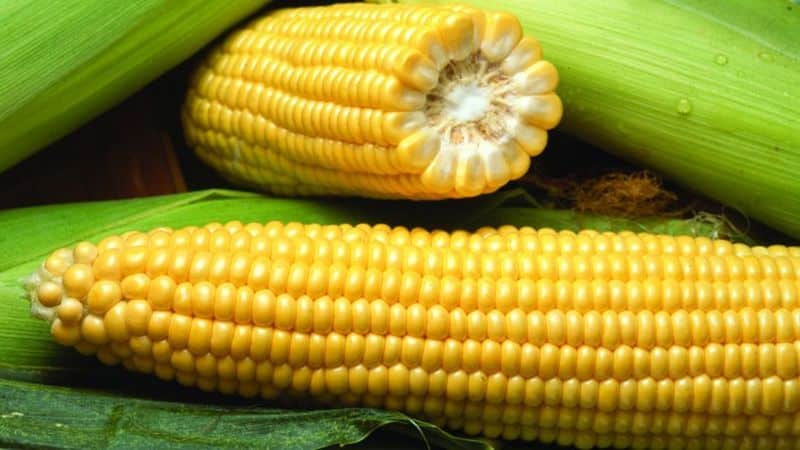
Health benefits and harms
The beneficial properties of corn are due to the fact that vitamins and nutrients from this plant are quickly absorbed by the body. Corn normalizes the functioning of the gastrointestinal tract, the production of sex hormones, and prevents the aging of the body and the development of cancer cells. It has a beneficial effect on a woman’s reproductive system, relieving pain during menstruation and reducing the symptoms of menopause.
Contrary to popular belief, corn is not modified. This process occurs only with those varieties that are sent for oil processing. Ordinary corn, which we eat, does not harm either our health or our figure.
The plant is used for medicinal purposes in folk medicine and cosmetology. Boiled corn cobs are used for constipation, liver diseases, gout, nephritis, for diseases of the cardiovascular system.
A corn-based mask is an effective remedy for various types of pigmentation on the face (including age-related). It will help even out the skin and get rid of scars and acne marks.
Corn, like any product, can have a negative effect on the body:
- in some people it provokes allergic reactions: if you are individually intolerant to this product or if you are prone to allergies, you will have to exclude it from the menu;
- Exceeding consumption norms leads to bloating, flatulence, and bowel dysfunction;
- substances contained in the product increase blood clotting.
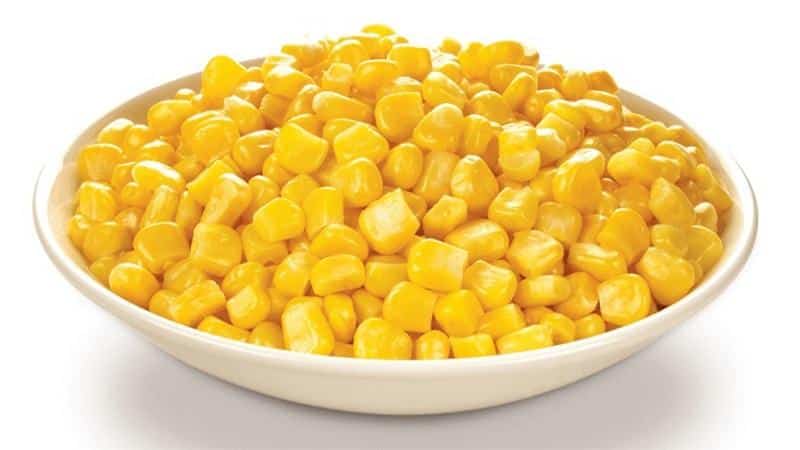
Is corn healthy?
Large amounts of fiber, vitamins A, E, choline and other beneficial substances, when consumed regularly, help improve internal organs, improve appetite, and improve well-being. Self-cleaning mechanisms are launched in the body, metabolic processes and the immune system are activated.
Beneficial properties for various body systems and diseases
Corn will help prevent many diseases. The benefits of the “queen of fields” are as follows:
- the plant is rich in fiber, which stimulates intestinal motility and helps with constipation;
- it effectively fights cholesterol and restores the functioning of the vegetative-vascular system;
- normalizes the production of sex hormones;
- B vitamins and amino acids help cope with fatigue and restore the functioning of the nervous system.
- it is a source of two powerful antioxidants - lutein and zeaxanthin, they protect the body's cells from mutations;
- the enzyme composition of corn prevents the development of cancer cells in the walls of the large intestine;
- selenium, which is part of the product, takes part in cleansing the liver and gall bladder;
- vitamin E prevents aging and the development of sclerosis;
- Corn silk is used for medicinal purposes for diabetes, liver, gallbladder, and kidney diseases.
Corn for weight loss
In dietary nutrition, the cereal is used boiled, steamed or grilled. Based on this product, a weight loss system was developed in 4 days. Those who decide to lose weight in this way are allowed to eat 800 grams of corn in the first two days, and 400 grams on the third and fourth days. You need to eat the product 4 times a day.
In addition to the basic diet, you are allowed to add several tomatoes, cucumbers, small Bell pepper, one carrot, greens. It is important to distribute them over all 4 days so that most of the products come on the first day, and the smaller part on the third.
Fruits are also allowed to be consumed in any quantity (with the exception of sour apples, which are best avoided during the diet). On one day - any day - you can eat about 150 g of mushrooms. In addition, it is important to drink a lot - at least 2 liters of clean water, as well as tea and fermented milk products.
Daily consumption rates
Composition of 100 g of corn according to the daily requirement:
- polyphenols normalize metabolism and strengthen the immune system. Protects against obesity and diabetes, and also strengthens the heart;
- fiber – 9-15% of the norm, cleanses the body, improves intestinal motility and normalizes microflora;
- vitamin B5 – 15%, participates in the biosynthesis of hormones, enzymes and cholesterol, ensures the absorption of sugar in the intestines;
- vitamin B1 – 13%, without it the normal functioning of the nervous system, heart and blood vessels is impossible. Participates in the formation of amino acids and enzymes;
- phosphorus – 11%, strengthens bones and participates in hormonal metabolism.
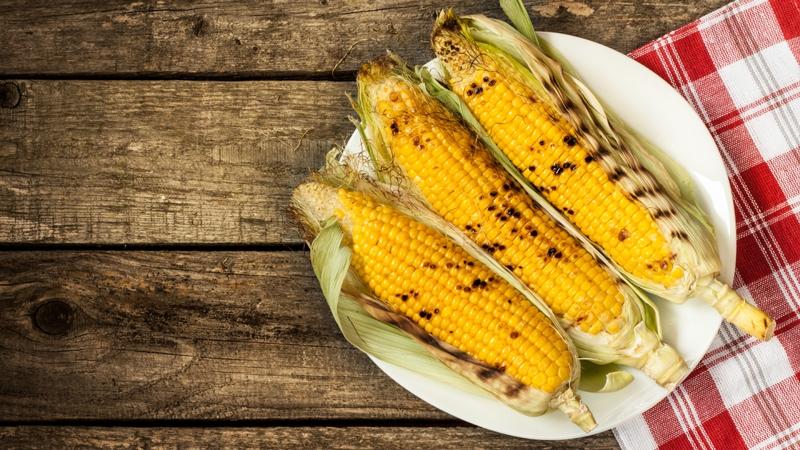
Standards for children, men, women (including pregnant women)
Boiled, canned corn, steamed or grilled grains can be consumed in the following quantities:
- adults – no more than 150 g per day (two medium ears);
- children - 50-75 g (one cob).
Is it possible to have boiled corn during pregnancy? If a woman is overweight, doctors do not recommend it. This is due to the fact that its calorie content is 123 kcal per 100 g. A woman of normal weight is allowed to consume corn.Microelements and vitamins effectively combat toxicosis in pregnant women when consuming just 1 cob per day and stimulate lactation in nursing mothers.
What is best to combine with
Canned grains are used as additional ingredients in the preparation of soups and salads. Corn goes well with vegetables, herbs, vegetable oil and butter.
Porridge is prepared from coarse corn flour. And fine flour is suitable for pancakes and puddings. Flour added to cookies or cakes gives it a special taste and friability. Corn flakes are made from crushed ripe corn kernels. All children love this product; it can be eaten with yogurt, juices, compote or milk.
Contraindications
Despite all the beneficial properties of corn, not everyone should eat it. Contraindications include:
- individual intolerance to the product;
- pancreatitis;
- exacerbation of peptic ulcer;
- excess body weight – more than 120 kg;
- poor appetite (corn is difficult to digest and may not be absorbed).
Conclusion
Corn is a healthy cereal crop. The calorie content of the product depends on the variety and method of preparation. 100 g of raw grains contain on average 86-90 kcal. Thanks to its unique vitamin and mineral composition, corn improves the functioning of internal organs and systems. The plant is used for medicinal purposes for diseases of the liver, gall bladder, kidneys, and atherosclerosis.
Corn is contraindicated in case of excess weight, exacerbation of peptic ulcer disease, a tendency to thrombosis, or individual intolerance.